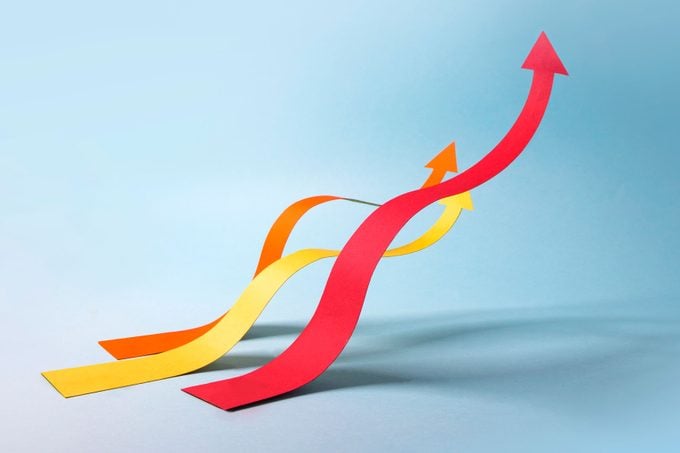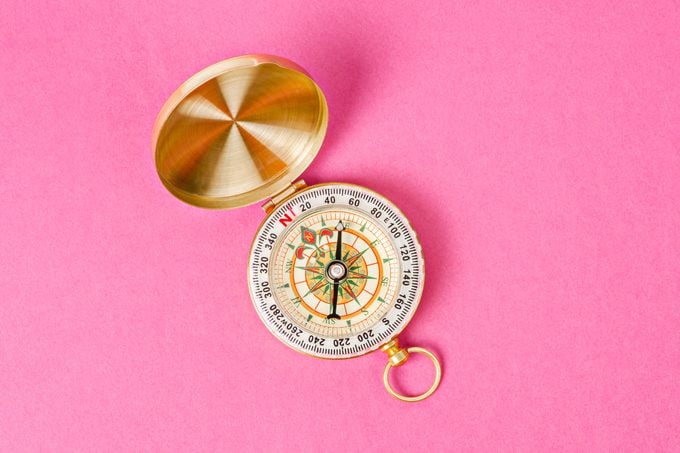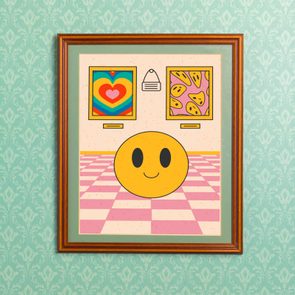How to Find Your Purpose in Life and Make Every Day More Meaningful
Updated: Apr. 26, 2023

Knowing your "why" isn't just nice—it's essential to living a happy, fulfilling, purposeful life
What is the purpose of life? There are as many answers to this age-old question as there are people, and they run the gamut from hopeful to nihilistic to, well, nonexistent. Here are just a few famous examples:
- For politician and action-film star Arnold Schwarzenegger, it’s all about action and winning. “The meaning of life is not simply to exist, to survive, but to move ahead, to go up, to achieve, to conquer,” he said.
- The 16th-century French writer and philosopher François Rabelais was less certain, saying the purpose of life is to “seek a Great Perhaps.”
- American author and mythologist Joseph Campbell managed to define it both very broadly and yet very personally. “Life has no meaning,” he said. “Each of us has meaning, and we bring it to life. It is a waste to be asking the question when you are the answer.”
- And then you have the silly: In The Hitchhiker’s Guide to the Galaxy, fantasy author Douglas Adams famously calculated that the answer to the “Ultimate Question of Life, the Universe and Everything is … 42.” Then he added, “That’s the answer. Unfortunately, no one knows what the question is.”
But the point isn’t what other people (even famous people) think the answer is—it’s how you answer that question for yourself, says Ryan McAnnally-Linz, PhD, co-author of Life Worth Living: A Guide to What Matters Most and associate director of the Yale Center for Faith and Culture.
“We don’t just ask about purpose in life as a matter of curiosity, like we might ask how many stars there are in our galaxy. We ask because the question matters to us, individually,” he says. “Each of us lives one life: our own. What we’re looking for isn’t just generic purpose but the purpose of that one and only life.”
Finding your own purpose will help you connect with your community and learn how to be happy, whether that’s by spending time with family, trying new things, doing volunteer work or practicing gratitude.
Get Reader’s Digest’s Read Up newsletter for humor, cleaning, travel, tech and fun facts all week long.
What we mean when we talk about the “purpose of life”
What’s the meaning of life? Go ahead and try to answer. If you’re finding it tough, it may be because you aren’t quite sure what the “purpose of life” even means, says Nakpangi Thomas, PhD, a licensed professional counselor specializing in dealing with existential crises and an adjunct professor at Southern New Hampshire University.
Broadly speaking, the “purpose of life” has two parts:
- Your personal paradigm, which organizes your beliefs, motivates your behavior, orients your actions and defines your individuality.
- Your community paradigm, which promotes the survival and betterment of humankind and your place in society. It provides the underlying moral framework for rules and laws and helps people make sense of what is “right” and “fair.”
Beyond that, the definition is unique to each person.
The right (and wrong) answer to “What is the purpose of life?”
There’s no one right answer to “What is the purpose of life?”—there are a bunch of right answers. But don’t let that fool you into thinking any old purpose will do. Be thoughtful about your purpose, because there are wrong answers too.
“I do think there are right and wrong answers here,” says McAnnally-Linz. “If there weren’t, the stakes wouldn’t be serious. We could just pick up and put down purposes at a whim. They couldn’t hold any real weight in our lives.”
So what makes for a bad purpose? For starters, it won’t enrich or better your life. “If you were to make it your purpose to lie to everyone you meet, sure, it would give you some orientation, but your life would be horribly warped,” he says. “You’d be better off purposeless.”
Unlike other actions that improve your life—say, learning time-management skills—finding your purpose is a lifelong process, not a one-time event. And it takes consideration. “It’s no easy thing to discern when we’ve answered the question well or gotten it wrong,” McAnnally-Linz says.
The benefits of having a life purpose

A purposeful life is a meaningful and intentional life and therefore benefits every aspect of your existence, says Thomas. The perks below are just a few benefits you can expect from finding your purpose in life.
You’ll be more focused
“To be purposeless is to be rudderless,” says McAnnally-Linz. Having purpose inspires you to define your life goals and stay honed in on achieving them—keeping your eye on the prize.
When your life has greater meaning, setting goals is a natural evolution of your desire to realize your purpose. Let’s say you want to help people grapple with mental illness. That greater purpose may motivate you to create a goal-setting vision board and take steps toward a career as a counselor.
You can make better and faster decisions
“A purpose sets a direction for life, which means you don’t always have to ask what to do and why in every situation,” McAnnally-Linz says. This allows you to make decisions quickly and effectively, knowing they’re aligned with your goals and true to your non-negotiables—those things you won’t compromise on.
When faced with a job offer, potential move or any other life change, you can weigh whether it’ll bring you closer to (or pull you further from) your life’s purpose.
You’ll feel happier
If you’re trying to be happier, start by searching for a greater meaning in your life. Science shows that a purposeful life is a happy life.
In a 2019 study published in the journal PNAS, people who had a sense of purpose were more likely to be happy, saying they more often felt pleasure, joy and satisfaction with their lives. This was true regardless of the person’s age, sex, education and socioeconomic status.
You’ll have better relationships and be less lonely
One of the most powerful side effects of understanding your purpose in life is a stronger bond with those around you. Not only is building a community a vital life skill, but it’s also tied to greater happiness. And it’s easier to do when your life has greater meaning.
The PNAS study found that people who considered their lives worthwhile were more likely to have stronger personal relationships—including romantic partners, family and friends—and were more engaged socially.
You’ll be more prosperous
There’s a good reason we ask “What is the purpose of life?” We want a more fulfilling existence. But let’s be honest: We’re fine with the fact that finding meaning in life can lead to a little more moola.
Yes, that is an outcome of understanding the purpose of life. (How’s that for gratitude journaling fodder?)
As the authors of the PNAS study found, people with a sense of purpose are more likely to have higher wealth and income than those who feel they’re drifting through life. This may be partly because people with greater wealth are able to spend more time doing things that give them a sense of purpose, but the reverse may also be true: Having purpose can keep you motivated to achieve your financial goals.
You’ll be healthier, both mentally and physically
Sure, happiness meditations and exercise can affect our emotions, but there’s another way to improve your mental well-being: live a purposeful life. The researchers behind the PNAS study found that purpose-driven participants reported not only better physical health but better mental health to boot. They had less depression, chronic disease, chronic pain, disability and obesity, along with greater upper-body strength, faster walking speeds and better heart health.
What gives? The research found that people with a purpose were more likely to engage in healthy behaviors—doing regular physical activity, prioritizing sleep, avoiding smoking and eating more fruits and vegetables (clearly, they don’t call it a happiness diet for nothing). A 2018 study in Population Health Management confirms these findings, reporting that older adults with a greater purpose in life were more likely than their peers to get preventative health screenings and adhere to their medications.
You’ll be more resilient in times of trouble
German philosopher Friedrich Nietzsche summed up the importance of finding one’s life purpose when he wrote, “If we possess our ‘why’ of life, we can put up with almost any ‘how.'” Knowing your purpose helps you endure setbacks and trials with grit, determination and resilience. Because the pain has a purpose, you can keep moving toward your goals, says Thomas.
You’ll be better able to make (and keep) healthy boundaries
People who spend their time trying to be everything to everyone—rather than focusing on their purpose—quickly burn out, says Thomas. “Defining your purpose helps you know when to go the extra mile and when to pull back. It prevents you from overextending yourself and from feeling guilty when you need to say no,” she says. Knowing your purpose in life automatically helps you prioritize your time and energy and set healthy boundaries with others.
How to find your life’s purpose

“Figuring out one’s individual purpose is a matter of finding the matches between the contours of your life and personality and your big vision of a life worth living,” says McAnnally-Linz. Here’s how to do just that.
1. Find your “why”
There are a lot of benefits to having a purpose (just look at that list above!), but you need to focus on the ones that feel most important to you. It’s a little meta, but knowing why you want a purpose will keep you motivated in finding yours, says Thomas.
So don’t just ask “What is the purpose of life?” Ask “Why do I want a purpose?” and “What do I hope this purpose will do for me?” Are you aiming for happiness? Do you feel like you’re wasting time and want to do something more meaningful with your life? Now is the time to determine why you’re searching for meaning in the first place.
2. Ask the big questions
Draw up a list of questions that touch on the most important things in your life, then write down your answers. Ultimately, your answers will help you see a pattern of who and what you prioritize. Once you know that, you can set goals based on your priorities.
So, what sort of questions should make the list? That will vary from person to person, but the “life questions” below will get you started.
- Who is most important to me?
- What are my happiest memories and experiences?
- What is the best way for people to live?
- What makes me feel most fulfilled?
- What is my biggest regret?
- What are three things I hope for?
- What do I do when I fail at something?
- What individual attributes are most important to my identity?
- What would be worth dying for?
3. Challenge your negative beliefs about yourself
Discovering your purpose starts with having a growth mindset and cultivating a positive attitude. Make a list of things you believe about yourself that are holding you back, and then challenge yourself to see them in a different light, says Thomas. For instance, perhaps you grew up being told you were stupid. Is that really true? Can you find evidence that you are smart?
4. Talk with—and listen to—others
Finding your purpose is an ongoing discussion with yourself, but it is immeasurably improved when you discuss it with others whose opinions you value, says McAnnally-Linz. “Listen to others,” he says. “They’ll see the world differently from you and help you see it better, whether you wind up agreeing with them or not. And oftentimes, they’ll help you see yourself better too.”
This doesn’t mean you need to talk with strangers about the meaning of life. But you should broach the topic with your nearest and dearest.
5. Learn about different philosophies
People have been trying to answer “What is the purpose of life?” since the dawn of time, and you can learn a lot from what they’ve discovered. Study religious and philosophical texts, watch documentaries, read books, attend lectures and do research. Will you unearth the answer to what The Hitchhiker’s Guide to the Galaxy calls the Ultimate Question of Life, the Universe and Everything? No—there’s no single answer, remember? But eventually, you’ll begin to find what resonates with you.
6. Clarify what you really want (and what you really don’t)
Once you’ve established your priorities and non-negotiables, it’s fairly simple to define your life goals. These are what you want out of your life in the areas of identity, career, finances, education, love, spirituality, family and more. They’ll bring you moments of joy and deeper meaning over the course of your life.
Then, take a moment to note what things you absolutely don’t want to happen. While you don’t want to spend too much time focusing on these fears, it’s important to know what they are so you can face your anxieties head on, says Thomas.
7. Write it down
They say an unwritten goal is just a wish, and that’s true for your purpose as well. Journal your thoughts as you go, with the goal of writing a personal mission statement. You should be able to define your purpose in one or two paragraphs. You don’t have to have answers for everything; your purpose just provides the guidelines for finding the answers as you go.
Tips on how to find purpose in life
Here are a few tips from our experts to help you really home in on your purpose in life:
- Embrace simplicity.
- Allow for revision.
- Forgive mistakes (yours and others’).
- Be open to new experiences (like a new hobby) and thoughts.
- Do not compare your journey with anyone else’s.
- Adjust your goals and expectations based on your priorities.
- Establish clearly defined boundaries, both with yourself and with others in your life.
- Schedule a regular time for self-reflection and self-evaluation.
- Stop chasing perfection.
This last point may be the most important, says Thomas. You’re not going to get it right on the first try. You may encounter things that change your sense of purpose. That’s not just OK—it’s the point. Remember, the process of finding your purpose is more important than what words you finally settle on.
Sources:
- Ryan McAnnally-Linz, PhD, co-author of Life Worth Living: A Guide to What Matters Most and associate director of the Yale Center for Faith and Culture
- Nakpangi Thomas, PhD, LPC, licensed professional counselor and adjunct professor at Southern New Hampshire University
- PNAS: “Leading a meaningful life at older ages and its relationship with social engagement, prosperity, health, biology and time use”
- Population Health Management: “Purpose in Life and Positive Health Outcomes Among Older Adults”



















